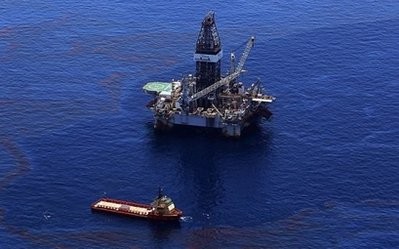GALLIANO, Louisiana (AFP) – BP officials warned Monday they may not be able to plug the Gulf of Mexico oil leak until August as Louisiana residents warned the spill would wipe out their way of life.
"Drilling relief wells is still seen as the best solution," but they will not be onstream for at least eight weeks, BP spokesman John Currie told AFP, as US officials warned the spill is now the worst environmental disaster to ever befall the United States.
BP engineers are scrambling to prepare their next bid to stop the oil from gushing into the sea, by using robotic submarines to cut off the burst pipe and then capping it before siphoning the oil up to vessels the surface.

Although local media said the "cut and cap" procedure was under way, Currie said the effort was unlikely to begin before Wednesday.
At least 20 million gallons of oil are feared to have already flooded into the Gulf since the Deepwater Horizon rig exploded 41 days ago on April 20 and sank into the sea two days later with the loss of 11 lives.
BP's last attempt to stop the leak, dubbed a "top kill," failed on Saturday leaving an estimated 12,000 to 19,000 barrels of oil belching into the Gulf every day.
The giant slick is threatening Louisiana's fragile wetlands, as well as the Gulf region's fishing and tourism industries, amid fears that hurricane season which starts Tuesday could push oil up onto the Florida, Texas, Mississippi and Alabama coastlines as well.
"I think what the American people need to know is that it is possible we will have oil leaking from this well until August when the relief wells will be finished," White House energy advisor Carol Browner warned Sunday.
Former shrimper turned tugboat captain Kevin "Godzilla" Curole told AFP, "This is going to kill more species of fish than BP even knows exist, and it will kill our whole way of life.
"People used to come here to fish. But now they're going to come here to look at a memorial to what is going to be an extinct way of life and tell their kids, 'See? Those are fishermen. They're the people who built this town and southern Louisiana," he said at his home in Galliano.
While some oil has washed onto the beach at Grand Isle, the only inhabited barrier island in Louisiana, and tarry black crude has smothered some of the wetlands at the mouth of the Mississippi River, large plumes of oil are hanging invisibly underneath the water.
Scientists and local fishermen believe BP's use of the dispersant Corexit has caused the oil to sink to the bottom of the sea, where it will not weather and degrade naturally.
New Orleans lawyer Shaun Holahan on Sunday tucked into a plate of oysters at the Plaquemines Seafood Festival, saying she had come to the annual event "because I think it's the last one they'll ever have.
"The oil in the water has probably killed off the larvae, meaning there will be no shrimp or fish or oysters next year... and probably not for years to come," Holahan said.
With many fishing grounds closed, seafood prices, and in particular the cost of Louisiana's trademark shrimp and oysters, have risen sharply and clients have stayed away from restaurants scared seafood is not longer safe.
Currie said BP was continuing to "work with the EPA on the issue of dispersants" but would keep using Corexit until an alternative solution was found that is "available, effective and meets low toxicity limits.
"We are using less dispersant, at the direction of the EPA," he added.
Meanwhile, Louisiana Senator David Vitter called for a military-style chain of command to handle the crisis, saying the procedure has been bogged down in red tape.
"We need the federal response to really get with it and go on a wartime footing and we need a military-style chain of command where orders are given and executed immediately," Vitter told local radio.
Angry Louisiana residents believe BP's efforts to stop the leak have been no more than a show while it builds the relief wells.
"It's all just smoke and mirrors," New Orleans resident Danielle Brutsche told AFP.
"What they're doing now, trying to cap the leak, I think they're just doing it to distract us so it looks like they're doing something while they build the relief wells," she said.
But BP's Currie told AFP the company was "heavily invested" in trying to stop the spill.
"We have spent 900 million dollars on this so far, and that would be a mighty expensive show we were putting on," he said.
























